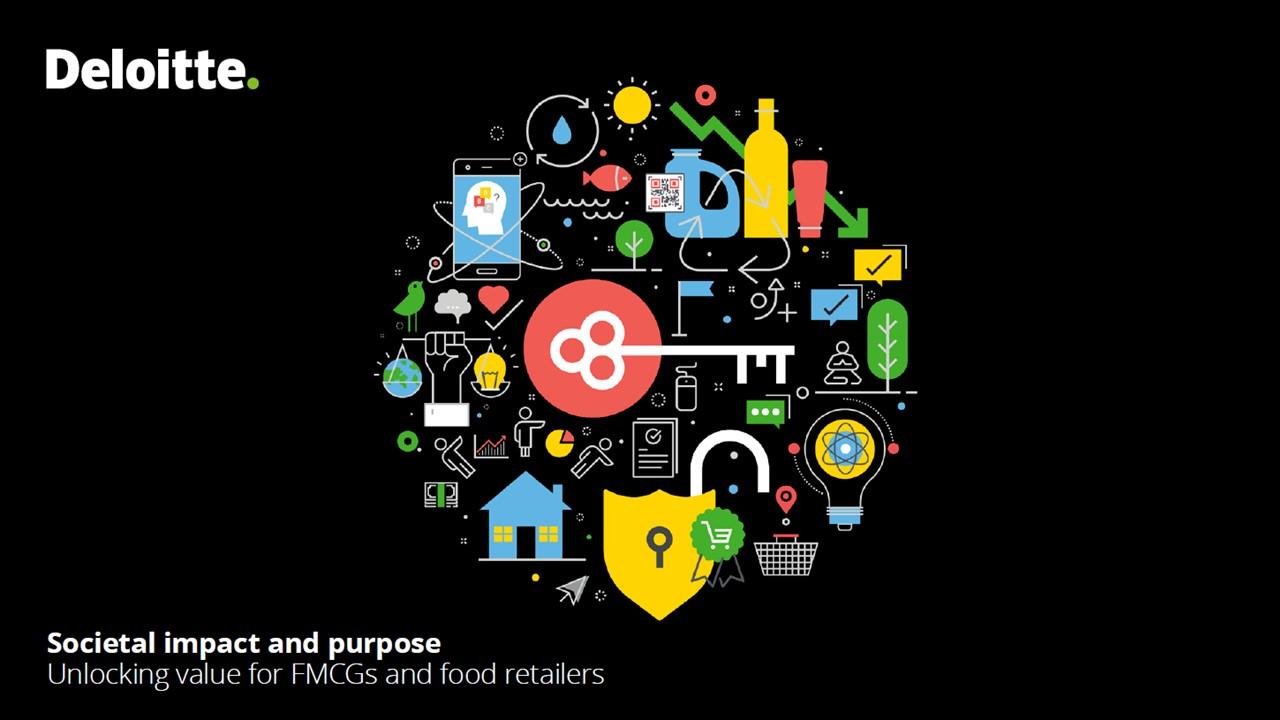
Societal impact and purpose: unlocking value for consumer products businesses

MEDIA RELEASE
30 May 2019: FMCG and food retail businesses see the need to champion societal impact, but are concerned about return suppressing the pace and depth of investments. But according to new Deloitte research – Societal impact and purpose: Unlocking value for FMCGs and food retailers – return does exist, and should give confidence to sector leaders.
According to Vanessa Matthijssen, Deloitte Australia National Consumer Products Leader:
“Australian business leaders agree that they have a significant role to play in addressing challenges that range from climate change to plastics, and from health and wellness to ethical sourcing and supply chains.
“And they are taking action. According to global research by Deloitte and Forbes Insights, they increasingly care about their impact, with one in four ranking having a positive societal impact as the most important success measure in evaluating annual performance, notably higher than pure financial performance metrics.
“However, more than half of consumer products leaders globally (51%) don’t believe societal impact initiatives have a positive impact on profitability, and this lack of confidence in a return is placing future social issue investment at risk, right when it’s needed most.
“To ensure the pace and depth of investment continues, and is seen as more than just a cost of doing business, we need to reframe the challenge, and unlock the value that societal investments can offer.”
Matthijssen said the return on societal impact investment is multi-faceted.
“Operating with societal purpose is becoming a talent imperative for businesses. People are keen to work for socially responsible companies, and engaged and committed employees can lower the costs of attracting and retaining talent and are generally more creative and more productive,” she said.
“Banks and other sources of capital are also increasingly conscious of their own societal impact commitments, and being on the right side can not only provide better access to capital, they can also reduce the cost of that capital.
“It’s also important to value chain partners, both upstream and downstream, and partnering with retailers on societal impact innovations can be the source of stronger strategic relationships that deliver value over and above the access to market.”
Matthijssen said that through their purchasing decisions, consumers were arguably the greatest source of return for FMCG companies and food retailers.
“Consumers are increasingly driven by their social and environmental values, and more and more, societal impact is driving consumer decision-making, loyalty, and willingness to pay,” she said.
Brands can take a leadership position by showing the consumer the societal problem, make them care, and let the solution for the problem manifest itself in their product. The product should offer functional (e.g. improved health) or emotional benefits (e.g. feeling good about the purchase) and in doing so make the consumer feel that they are making a difference.
“The societal impact agenda is often set by activist groups, governments or retailers, but when brands lead on societal impact, they not only determine the driver of choice, they control the value it has in the eyes of the consumer, and they then hold the premium,” Matthijssen said.
“Yes, consumer value can be hard to unlock, it requires behavioural change, and that is especially hard in a habitual area such as grocery shopping. For consumers to act on their values, they need to see the problem, feel it, and understand how they can make a difference by associating themselves with the brand and the product.”
“We encourage brands to tell their social impact story. Too many of today’s impact initiatives live in a CSR report, but aren’t communicated at the coal face. Societal impact stories will have to come down from a corporate level to a brand and product as that is what the consumer connects with.”
The report also looks at how emerging technologies, such as artificial intelligence (AI), smart packaging and conversational voice, are changing the way brands can connect on societal impact.
“AI-powered marketing will allow brands to use values-based micro segmentation and personalisation at scale, and packaging fuelled by technology is fast becoming an interactive digital channel, helping brands to tell their societal impact stories and capture the attention of the consumer in a moment that truly matters, be that in store or at the point of consumption,” Matthijssen said.
“And voice commerce and natural language processing and can bring a human element, and empathy, to the consumer conversation.
“Finally, it’s important to recognise that brands operate in broader ecosystems that run from suppliers and retailers to government, regulators and third party certifiers. All have the power to amplify or diminish value and reinforce trust and authenticity, and just as much to break it when values are in conflict.
“Collaboration with the retailer is particularly critical, and an effective two-way dialogue, or joint investments on shared values can deliver real returns.”
DOWNLOAD THE REPORT: Societal impact and purpose: Unlocking value for FMCG and food retailers
For further information:
Vanessa Matthijssen - Deloitte Australia Consulting partner & National Consumer Products Leader
T: +61 2 9322 5128 | E: vmatthijssen@deloitte.com.au
Simon Rushton - Corporate Affairs & Communications
M: +61 450 530 748 | T: +61 2 9322 5562 | E: srushton@deloitte.com.au












